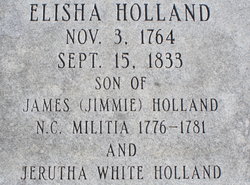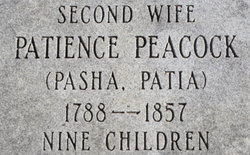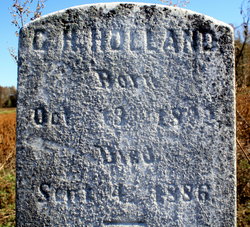| Description |
: |
Aged 83 years 3 months 12 days
Chandler Daily Publicist. (Chandler, Lincoln Co., Okla. Terr.), Tuesday, September 22, 1903
Gathered to His Fathers.
Beneficent Close of the Long and Upright Life of Our Fellow Townsman, West Holland – Laid to Rest in the Community Which He Did so Much to Develop.
West Holland was born in Wayne county, North Carolina, June 7, 1820. Died at Chandler, Oklahoma, September 19, 1903, and was laid to rest at Hackney, Kansas, within sight of his pioneer home, on Sunday, September 20, 1903.
Mr. Holland was one of those sturdy characters that form...
Read More
|
Aged 83 years 3 months 12 days
Chandler Daily Publicist. (Chandler, Lincoln Co., Okla. Terr.), Tuesday, September 22, 1903
Gathered to His Fathers.
Beneficent Close of the Long and Upright Life of Our Fellow Townsman, West Holland – Laid to Rest in the Community Which He Did so Much to Develop.
West Holland was born in Wayne county, North Carolina, June 7, 1820. Died at Chandler, Oklahoma, September 19, 1903, and was laid to rest at Hackney, Kansas, within sight of his pioneer home, on Sunday, September 20, 1903.
Mr. Holland was one of those sturdy characters that form the backbone of our republic. His life was a long and eventful one, the record of which would form an interesting volume. We can but give it in outline, yet we trust that our readers may catch the spirit of this useful life.
In the land of his birth, Mr. Holland grew up, married, and there all of his children, thirteen in number, were born. His wife was a woman well fitted to be the helpmeet of such a man, intellectual, sensible, broadly charitable. She was Miss Sally Grice; they were married December 12, 1844, and for forty-two eventful years they fought life’s battle bravely side by side, meeting the vicissitudes of pioneer life on the prairies of southern Kansas, having come to Arkansas City in 1870. They were passengers to Emporia on the first train which was run over the Santa Fe. From that point they drove to Cowley county, where Mr. Holland and his two older sons took up claims, that of the father and N.G. adjoining and forming the old homestead, which was sold only four years ago, after Mr. Holland came to make his home in Chandler. The claim of the other son, Dr. C.G., adjoined what is now Arkansas City, then called Walnut. The town at that time consisted of one log store. West Holland erected the first square front building in the town on a lot which was given to him by the townsite company on condition that he would build upon it. It was located opposite what is now the Gladstone hotel. There Dr. C.G. Holland opened an office and began the practice of medicine. The sons, N.G. and A.C., built a log saw mill and turned out the lumber which went into the construction of the early buildings of the town.
Mr. Holland brought his family to Arkansas City in the fall of 1876, after harvesting the crop on a farm which he had rented at Emporia and where he left his wife and younger children, when eh and the older boys came to file on their Cowley county claims.
Then began in earnest the struggle to build up a home in that new country. Indian scares, grasshoppers and crop failures are chapters common to the history of the pioneers of Kansas, but each one had his personal experiences which are full of interest and we wish that we might quote more fully than we may. We cannot forbear the relation of one instance: During the time that the fear of Indian raids filled all households with terror, the family was awakened in the dead of a cold night by a blood-curdling Indian yell and the hoof-beats of galloping horses. Without stopping to dress, the family made a mad dash for a draw back of the house. Mr. Holland, who had thrown a quilt about his shoulders, became separated from the others before reaching the ravine by reason of having stopped to loosen a horse on picket rope, and when he finally reached the edge of the draw, the family mistook his tall quilt-clad form in the moonlight for that of a blanketed Indian and crouched closer in the shadows while he peered along the banks in search of them. He was afraid to call out for fear of attracting the Indians to their hiding place, and they for fear he was an Indian; so it was some time before he found them and allayed their fears. They afterwards learned that instead of Indians, it was the dare devil gambler Art Paterson and several drunken companions on the way from Winfield to Arkansas City, who were amusing themselves by giving the Indian war whoop at each farm house they passed where there was a barking dog to remind them they were passing a habitation.
This furnished an incident over which the family often laughed, and it set in contrast darker scenes which seemed to have no bright side. Just one year from the day that the family moved onto the claim, the son N.G. or “Sport” as they called him, died, and his was one of the early graves which soon marked the new settlement.
And so life went on, marked by the cares, sorrows and joys of the settler in a new country. But it was a country of magnificent resources and despite the devastation of grasshoppers and an occasional failure of crops from drouth, its development was rapid, and Mr. Holland from the first took his place with the most respected leaders in all movements for the organization and development of the new settlement. He had always taken an active interest in public questions. At the time he left North Carolina, he had served four years as register of deeds and had just been elected to the third term. He resigned the place to move to Kansas. He was especially interest in the cause of education and the building up of a strong public school system in the new community. He gave the land for the school which was the fourth school house built in Pleasant Valley, and it is still known as the Holland school house. It was at this school that Jessie James and five of his gang stopped for water on their way to rob the Arkansas City bank in 1875. On that day the only pupils present were Jency and Edith Holland and one other little girl.
The Holland home was always marked by the broadest hospitability. Husband and wife were one in their whole-souled great-heartedness, qualities which their children have inherited in marked degree. Large as their family was and as small as was the first claim house, there was always room at the hearthside and in the hearts of this noble couple for the suffering and distressed. They had already raised one orphan boy to manhood when they left North Carolina and tho Mr. Holland’s resources were small, he assisted another deserving boy who wished to go with them to do so by paying his railway fare. They also took a homeless baby to raise but its father reclaimed it when it had reached the age of four years. We might repeat story after story illustrating the fatherly and motherly kindness of West Holland and wife that brought them into helpful contact with every case of suffering for miles about them and made their hospitality marked even in that community celebrated for its great-hearted people. After the death of his wife which occurred Nov. 28, 1886, Mr. Holland admonished his daughters to continue the kindly ministrations to the sick which had made their mother an angel of mercy, and so long as the old gentleman lived, he frequently reminded them that they must not forget to care for those who were sick or in trouble, and they surely do care for such.
The years went on in the happy home in Pleasant Valley. The children grew to man and womanhood and went forth to home of their own. Four of them were already married when the dear mother folded her hands in the last sleep. When the families of R.B. Holland and J.W. Feuquay came to Oklahoma at the time this country was opened to settlement, it left Mr. Holland and his two daughters Lou and Edith alone on the farm. He became too feeble to carry on his farm and it was not profitable to either rent or hire the work done. By this time his children were widely scattered but more of them were in Oklahoma than any other one place, so the two family in Chandler prevailed upon their father and two sisters to come here and spend a season to see how they liked it. They were so well pleased that they sold the old home in 1899 and invested the proceeds here. It has not only furnished them a comfortable living but the principal is still intact.
In his new home, as in the old one, Grandpa Holland won the love of all who knew him. He had been a wide reader all his life and possessed a mine stored with varied information. A keen sense of humor, a cheery disposition and an unfailing interest in the lives and sympathy for those around him, made him a charming companion to the last. He had a stroke of paralysis before leaving Kansas, from which he so far recovered s to be able to go about by moving cautiously. In pleasant weather he came up town once or twice a week and everyone was always glad to see him. On Monday of last week he came up for the last time. He was taken with spasms that night and lingered in semi-consciousness until Saturday morning, when his spirit was released from the pain-wracked body. Accompanied by loving children, the remains were taken to the old home for burial. The little party reached the station of Freshan at 4 o’clock Sunday afternoon. Tho the telegram announcing the coming had not reached the neighborhood until 6 o’clock Saturday evening, the old friends had turned out en masse. At least seventy-five carriages were in waiting when the train arrived, and had proof been lacking that Grandpa Holland was held in the highest esteem at his old home as at the new, it would have been furnished by the sad, tearstained faces of his old neighbors who had gone through the vicissitudes of pioneer life with him. It seemed like a great family come to receive their dead brother. Arrived at the cemetery, half as many more were found there who had learned the news too late to reach the station, some having driven fourteen miles.
All gathered about the open coffin and a few touching words were spoken by Rev. Ward of the M.E. church at Winfield. Then by loving hands all that was mortal of our dear old friend was lowered to its last resting place. The scene was most impressive. The setting sun looked down upon the closing scene of this nobly useful life with the same benignant smile that it had shed upon him when he arrived in that new land, and there in sight of the old home, beside his wife and son and daughter who had preceded him to the other side, he laid him down in his last sleep in the community which he had done so much to make one of the best in all the glorious state of his adoption, and the feeling in every heart as the friends turned form the new made grave was that the scene was a fitting close to the grand life whose strongest years had been lived out here, leaving a peerless example of unselfish kindness and rugged uprightness of life to coming generations.
He leaves behind him ten living children. They are:
Dr. C.G. Holland, of Blackwell; C.C. Holland of the war department, Washington, D.C.; A.C. Holland, Mayor of Hobart; Dr. A.W. Holland, Hobart; W. Bob Holland, journalist of New York City, now on the Journal; Mrs. Mattie Russell, New York City; R.B. Holland, Mrs. J.W. Feuquay and Misses Lougenia and Edith Holland of Chandler.
Mrs. Candace Peacock of Bristow is the only surviving member of Mr. Holland’s family. She is 80 years old and has recently moved here from Alabama with a daughter and two sons. She and Mr. Holland enjoyed being together so much that it was hoped they might be spared to each other for many years yet, but it was not to be. Sympathy, warm and deep, goes out to her and the children in their sorrow. But they have the consolation of looking back over the long and wisely spent life of their dear one, of knowing that in his declining years he lacked for nothing that love and care could bestow and of feeling sure that he is not only reaping the personal benefit of his right living but that the never ending influence of his beautiful life is going forward in ever widening waves for good.
NOTE: bio info provided by Contributor: Emily Jordan (47063153) • [email protected] |




